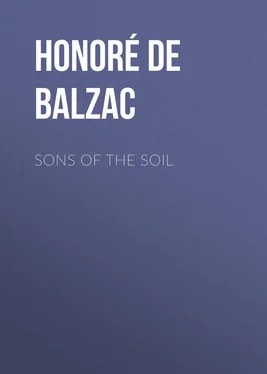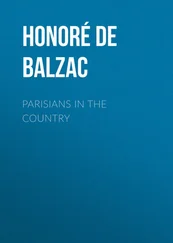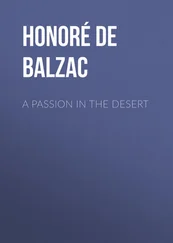Honoré Balzac - Sons of the Soil
Здесь есть возможность читать онлайн «Honoré Balzac - Sons of the Soil» — ознакомительный отрывок электронной книги совершенно бесплатно, а после прочтения отрывка купить полную версию. В некоторых случаях можно слушать аудио, скачать через торрент в формате fb2 и присутствует краткое содержание. Жанр: literature_19, foreign_antique, foreign_prose, на английском языке. Описание произведения, (предисловие) а так же отзывы посетителей доступны на портале библиотеки ЛибКат.
- Название:Sons of the Soil
- Автор:
- Жанр:
- Год:неизвестен
- ISBN:нет данных
- Рейтинг книги:5 / 5. Голосов: 1
-
Избранное:Добавить в избранное
- Отзывы:
-
Ваша оценка:
- 100
- 1
- 2
- 3
- 4
- 5
Sons of the Soil: краткое содержание, описание и аннотация
Предлагаем к чтению аннотацию, описание, краткое содержание или предисловие (зависит от того, что написал сам автор книги «Sons of the Soil»). Если вы не нашли необходимую информацию о книге — напишите в комментариях, мы постараемся отыскать её.
Sons of the Soil — читать онлайн ознакомительный отрывок
Ниже представлен текст книги, разбитый по страницам. Система сохранения места последней прочитанной страницы, позволяет с удобством читать онлайн бесплатно книгу «Sons of the Soil», без необходимости каждый раз заново искать на чём Вы остановились. Поставьте закладку, и сможете в любой момент перейти на страницу, на которой закончили чтение.
Интервал:
Закладка:
The peasant has an instinct for his habitation like that of an animal for its nest or its burrow, and this instinct was very marked in all the arrangements of this cottage. In the first place, the door and the window looked to the north. The house, placed on a little rise in the stoniest angle of a vineyard, was certainly healthful. It was reached by three steps, carefully made with stakes and planks filled in with broken stone and gravel, so that the water ran off rapidly; and as the rain seldom comes from the northward in Burgundy, no dampness could rot the foundations, slight as they were. Below the steps and along the path ran a rustic paling, hidden beneath a hedge of hawthorn and sweet-brier. An arbor, with a few clumsy tables and wooden benches, filled the space between the cottage and the road, and invited the passers-by to rest themselves. At the upper end of the bank by the house roses grew, and wall-flowers, violets, and other flowers that cost nothing. Jessamine and honey-suckle had fastened their tendrils on the roof, mossy already, though the building was far from old.
To the right of the house, the owner had built a stable for two cows. In front of this erection of old boards, a sunken piece of ground served as a yard where, in a corner, was a huge manure-heap. On the other side of the house and the arbor stood a thatched shed, supported on trunks of trees, under which the various outdoor properties of the peasantry were put away, – the utensils of the vine-dressers, their empty casks, logs of wood piled about a mound which contained the oven, the mouth of which opened, as was usual in the houses of the peasantry, under the mantle-piece of the chimney in the kitchen.
About an acre of land adjoined the house, inclosed by an evergreen hedge and planted with grape-vines; tended as peasants tend them, – that is to say, well-manured, and dug round, and layered so that they usually set their fruit before the vines of the large proprietors in a circuit of ten miles round. A few trees, almond, plum, and apricot, showed their slim heads here and there in this enclosure. Between the rows of vines potatoes and beans were planted. In addition to all this, on the side towards the village and beyond the yard was a bit of damp low ground, favorable for the growth of cabbages and onions (favorite vegetables of the working-classes), which was closed by a wooden gate, through which the cows were driven, trampling the path into mud and covering it with dung.
The house, which had two rooms on the ground-floor, opened upon the vineyard. On this side an outer stairway, roofed with thatch and resting against the wall of the house, led up to the garret, which was lighted by one round window. Under this rustic stairway opened a cellar built of Burgundy brick, containing several casks of wine.
Though the kitchen utensils of the peasantry are usually only two, namely, a frying-pan and an iron pot, with which they manage to do all their cooking, exceptions to this rule, in the shape of two enormous saucepans hanging beneath the mantle-shelf and above a small portable stove, were to be seen in this cottage. In spite, however, of this indication of luxury, the furniture was in keeping with the external appearance of the place. A jar held water, the spoons were of wood or pewter, the dishes, of red clay without and white within, were scaling off and had been mended with pewter rivets; the heavy table and chairs were of pine wood, and for flooring there was nothing better than the hardened earth. Every fifth year the walls received a coat of white-wash and so did the narrow beams of the ceiling, from which hung bacon, strings of onions, bundles of tallow candles, and the bags in which a peasant keeps his seeds; near the bread-box stood an old-fashioned wardrobe in walnut, where the scanty household linen, and the one change of garments together with the holiday attire of the entire family were kept.
Above the mantel of the chimney gleamed a poacher’s old gun, not worth five francs, – the wood scorched, the barrel to all appearances never cleaned. An observer might reflect that the protection of a hovel with only a latch, and an outer gate that was only a paling and never closed, needed no better weapon; but still the wonder was to what use it was put. In the first place, though the wood was of the commonest kind, the barrel was carefully selected, and came from a valuable gun, given in all probability to a game-keeper. Moreover, the owner of this weapon never missed his aim; there was between him and his gun the same intimate acquaintance that there is between a workman and his tool. If the muzzle must be raised or lowered the merest fraction in its aim, because it carries just an atom above or below the range, the poacher knows it; he obeys the rule and never misses. An officer of artillery would have found the essential parts of this weapon in good condition notwithstanding its uncleanly appearance. In all that the peasant appropriates to his use, in all that serves him, he displays just the amount of force that is needed, neither more nor less; he attends to the essential and to nothing beyond. External perfection he has no conception of. An unerring judge of the necessary in all things, he thoroughly understands degrees of strength, and knows very well when working for an employer how to give the least possible for the most he can get. This contemptible-looking gun will be found to play a serious part in the life of the family inhabiting this cottage, and you will presently learn how and why.
Have you now taken in all the many details of this hovel, planted about five hundred feet away from the pretty gate of Les Aigues? Do you see it crouching there, like a beggar beside a palace? Well, its roof covered with velvet mosses, its clacking hens, its grunting pig, its straying heifer, all its rural graces have a horrible meaning.
Fastened to a pole, which was stuck in the ground beside the entrance through the fence, was a withered bunch of three pine branches and some old oak-leaves tied together with a rag. Above the door of the house a roving artist had painted, probably in return for his breakfast, a huge capital “I” in green on a white ground two feet square; and for the benefit of those who could read, this witty joke in twelve letters: “Au Grand-I-Vert” (hiver). On the left of the door was a vulgar sign bearing, in colored letters, “Good March beer,” and the picture of a foaming pot of the same, with a woman, in a dress excessively low-necked, on one side, and an hussar on the other, – both coarsely colored. Consequently, in spite of the blooming flowers and the fresh country air, this cottage exhaled the same strong and nauseous odor of wine and food which assails you in Paris as you pass the door of the cheap cook-shops of the faubourg.
Now you know the surroundings. Behold the inhabitants and hear their history, which contains more than one lesson for philanthropists.
The proprietor of the Grand-I-Vert, named Francois Tonsard, commends himself to the attention of philosophers by the manner in which he had solved the problem of an idle life and a busy life, so as to make the idleness profitable, and occupation nil.
A jack-of-all-trades, he knew how to cultivate the ground, but for himself only. For others, he dug ditches, gathered fagots, barked the trees, or cut them down. In all such work the employer is at the mercy of the workman. Tonsard owned his plot of ground to the generosity of Mademoiselle Laguerre. In his early youth he had worked by the day for the gardener at Les Aigues; and he really had not his equal in trimming the shrubbery-trees, the hedges, the horn-beams, and the horse-chestnuts. His very name shows hereditary talent. In remote country-places privileges exist which are obtained and preserved with as much care as the merchants of a city display in getting theirs. Mademoiselle Laguerre was one day walking in the garden, when she overheard Tonsard, then a strapping fellow, say, “All I need to live on, and live happily, is an acre of land.” The kind creature, accustomed to make others happy, gave him the acre of vineyard near the gate of Blangy, in return for one hundred days’ work (a delicate regard for his feelings which was little understood), and allowed him to stay at Les Aigues, where he lived with her servants, who thought him one of the best fellows in Burgundy.
Читать дальшеИнтервал:
Закладка:
Похожие книги на «Sons of the Soil»
Представляем Вашему вниманию похожие книги на «Sons of the Soil» списком для выбора. Мы отобрали схожую по названию и смыслу литературу в надежде предоставить читателям больше вариантов отыскать новые, интересные, ещё непрочитанные произведения.
Обсуждение, отзывы о книге «Sons of the Soil» и просто собственные мнения читателей. Оставьте ваши комментарии, напишите, что Вы думаете о произведении, его смысле или главных героях. Укажите что конкретно понравилось, а что нет, и почему Вы так считаете.












